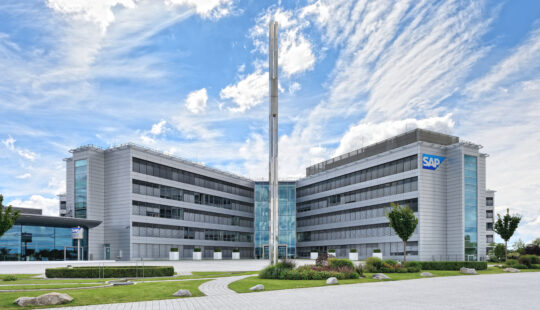Cemal Ezel was a commodity broker in London. He had his dream job and from a financial and professional perspective, it was everything he’d ever wanted. After a few years, though, he increasingly felt that his daily work revolved solely around someone winning at the expense of someone else losing – and it didn’t sit right with him. He knew he could do more.
On his way to work one day, he encountered a homeless person on the sidewalk holding up a cardboard sign on which was written, “Keep your coins, I want change.” This call for change triggered Cemal’s social enterprise journey. He founded Change Please, a coffee provider that reinvests its profits to train the homeless as professional baristas. Cemal and team provide each trainee with housing within 10 days, a bank account, and access to in-house counselors, and typically support them into a living-wage job and the dignity of work within six months.
Cemal’s social enterprise has boomed, quadrupling its turnover and tripling the number of people they support. They have extended from London to Los Angeles and San Francisco, to Sydney and Melbourne, and were named Sir Richard Branson’s startup of the year.
This is more than Cemal’s story. This is the story of the social enterprise movement, businesses spiritually and operationally focused on changing the world. Social enterprises like Cemal’s operate in every market and every industry. They are just like any other commercially viable business, but with three crucial differences:
- Their purpose: They are founded and governed on the basis of a clear social or environmental mission.
- Their business model: They reinvest the majority — in the case of Change Please, all — of their profit into this mission.
- Their independence: They are majority controlled solely in the interest of this mission.
Understanding the social enterprise movement and the promise it holds is far more than a feel-good story; I am convinced it is the future of business.
The Imperative of Social Entrepreneurship
The concept of social enterprise underlies SAP’s very mission: to help the world run better and improve people’s lives. This mission connects us closely to the movement, and we are both inspired by and seek to inspire social entrepreneurship throughout the global economy.
This isn’t just corporate philanthropy or even traditional corporate social responsibility (CSR). This is about having an environmental or humanitarian mission woven into the fabric of a business. And this is what it’s going to take if we are to overcome the environmental and social challenges we face today.
We already knew that business had a much more active role to play in building a more inclusive, more sustainable global economy. We already knew businesses needed to find a better way to grow. And now, with life under COVID-19, finding a better way to grow has new urgency.
How does social entrepreneurship help? The pandemic threatens to intensify inequality. But it also presents us with a once-in-a-century opportunity. The economy has effectively stopped, and it is now in our power to shape how we start it up again. I believe social entrepreneurship plays a fundamental role in how we rebuild our economy from here. And the most immediate way we can create greater impact is in the way we procure goods and services.
Social Procurement at the Heart of Purpose
Every company in every industry needs to procure. We all need soap in our washrooms, landscaping for our offices, food and drink in our cafeterias, marketing services, office supplies, pest control, and even talent acquisition. These and many more are all products and services provided by social enterprises. This is money we are spending anyway. Why not spend it with suppliers who are delivering certified social impact as well?
For every dollar, pound, or euro companies invest in traditional CSR programs, we spend 400 on the indirect goods and services we use to run our business. By simply directing a proportion of this spend toward organizations with a social or environmental mission, our spend has a drastically improved impact.
SAP has engaged with social enterprise since 2010, but not until recently have we begun a concerted effort to direct our own spend to these organizations. As part of a pilot in the UK, we were able to direct 2.5 percent of our addressable spend to social enterprises, including Change Please, in just nine months, and there is still much more potential to tap. In this process, we destroyed some entrenched myths:
- Myth 1: Social enterprises are too expensive. Not the case. By integrating these suppliers into our supply chain we have actually been able to save money.
- Myth 2: Social enterprises deliver lower quality. Quite the opposite. So far, our employees have been much happier with the products and services we buy from social enterprises.
- Myth 3: Social enterprises are too small to deliver to corporates. Very much the contrary. In the UK, we have engaged more than 20 social enterprises across four procurement categories in fewer than nine months, in full compliance with our stringent procurement policies.
These are often the key performance indicators (KPIs) procurement teams apply in assessing their suppliers. But other benefits may surprise you. Not only your procurement teams but also buyers across your lines of business will be energized knowing that the purchasing decisions they make each day have a direct impact on improving lives and helping the environment. What we’re seeing here is undeniable value plus.
Introducing 5 & 5 by ‘25
When more and more corporates partner with social enterprises in this way, the impact is substantial. SAP is not just procuring more from social enterprises, we are working on making it easier for our customers to do the same. Ariba Network is the largest business-to-business marketplace in the world, supporting nearly US$3.5 trillion in transactions each year. In partnership with leading social enterprise interest organizations, we are opening this network up to their members, connecting corporate-ready social enterprises with more organizations that want to make a difference with their spend.
We have formalized our ambition in what is known as 5 & 5 by ‘25, SAP’s public initiative to direct five percent of our addressable spend to social enterprises and five percent to diverse businesses by 2025. Together with our social enterprise intermediaries, customers, partners, and social enterprises themselves, we have set out to expand social procurement where infrastructure exists and establish the infrastructure and build capacity where it does not. We invite our entire ecosystem to learn more and take part, join us in this initiative, and help build the pathways and the momentum to realize this ambition.
5 & 5 by ’25 is part of the SAP One Billion Lives program I founded six years ago to help marshal the best of SAP – our core business, our people’s passion, and our vast ecosystem in service of social good. 5 & 5 by ’25 furthers our mission to positively impact 1 billion lives specifically by supporting social entrepreneurs and accelerating the integration of social enterprises into the global economy through procurement practices.
Purpose and profit can and must co-exist. The social enterprise movement isn’t only evidence; it’s inspiration.
Adaire Fox-Martin is a member of the Executive Board of SAP SE and a Global Buy Social Ambassador for Social Enterprise UK.



